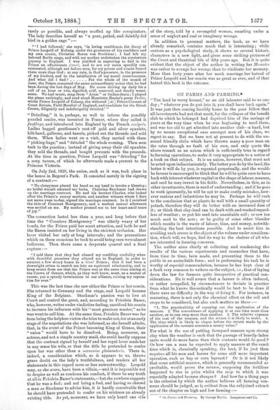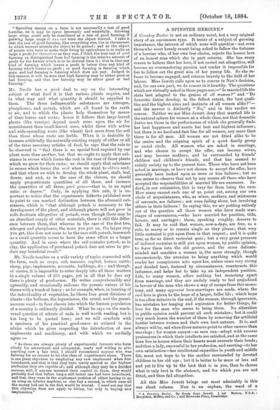ON FARMS AND FARMING.*
"THE land be werry honest," as an old labourer said to us one day ; "whatever you do put into it, you shall have back again." It was just then coming forcibly home to the poor fellow that
all investments had not that merit, for the collapse of the benefit club to which he belonged had deprived him of the savings of years at the very time when he was beginning to need them,.
and was too old to get admitted into another club—a hard, but by no means exceptional case amongst men of his class, we regret to say. But we have not at present to do with the un- sound friendly clubs which have thrown many a poor man on
the rates through no fault of his own, and only quote the above remark as an axiom which is sufficiently true in regard,
to farming operations, to make it very appropriate to a notice of a book on that subject. It is an axiom, however, that must not be acted upon indiscriminately. The better you do by the land, the better it will do by you, is repeated perpetually, and the would- be farmer is encouraged to think that he will be quite sure to have back with interest whatever capital in the shape of labour, manure, and seed he may invest in his fields. Nevertheless, in this, as in other investments, there is need of understanding ; and if he goes to work ignorantly, he will be apt to make costly mistakes, how- ever zealous and industrious he may be. Perhaps he will rush to the conclusion that as plants do well 'with a small quantity of potash, therefore they will do better with an increased dose of it ; or think that clay-land can be dealt with and worked regard- less of weather ; or put his seed into unsuitable soil ; or sow too. much seed to the acre ; or be guilty of some other blunder which results in the waste of labour, time, and money, notwith- standing the best intentions possible. And to assist him in avoiding such errors is the object of the volume under considera- tion, which will, we hope, find its way to the shelves of all who are interested in farming concerns.
The author aims chiefly at collecting and condensing the results of the various experiments and researches that have,.
from time to time, been made, and presenting them to the public in an assimilable form ; and in performing his task he is worthy of especial commendation, because he has kept clear of a fault very common to writers on the subject, i.e., that of laying down the law for farmers quite irrespective of practical con- siderations. He is well aware that a farmer is often induced, or rather compelled, by circumstances to deviate in practice from what he knows theoretically would be best to be done if there were no difficulty in the way of doing it. For instance, in manuring, there is not only the chemical effect on the soil and crops to be considered, but also such matters as these :—
"1. The practicability of carrying out the application of the manure. 2. The convenience of applying it at one time more than another, or to one crop more than another. 3. The relative expense of tbe cost of the manure, and the return it is likely to make. 4. The time which is likely to elapse before the return made by the application of the manure assumes a money value."
For what is the use of putting farmyard manure upon strong clay when the weather is such that the passage of heavily-laden carts would do more harm than their contents would do good ? Or how can a man be expected to apply manure at the exact time which is, chemically speaking, the best, if he just then requires all his men and horses for some still more important operation, such as hay or corn harvest ? Or is it not likely that some artificial manure, which is generally recommended as profitable, would prove the reverse, supposing the fertiliser happened to rise in price whilst the crop to which it was- especially adapted became cheaper ? And how far a thing pays is the criterion by which the author believes all farming con-
cerns should be judged, as is evident from the subjoined extract- out of the chapter on high and low farming :— • On Farms and Farming. By George Nevile. Longmans and 03. " Spendinufaoney on a farm is not necessarily a test of good farming, ea it may be spent ignorantly and wastefully. Growing large el-ups could only be considered as a test of good farming, if growing large crops at any cost were the object desired. I take it that the test of good farming, like everything else, lies in the amount to which success attends the object to be gained; and as the object of people who have to make their living by agriculture is to make as large a profit for themselves as they can, I think the true test of good farming as distinguished from bad farming is the relative amount of profit for the farmer which is to be derived from it ; that is, that any kind of farming which leaves a profit is better than any kind of farming which leaves no profit ; or good farming is farming which. pays, and bad farming is farming which does not pay. Judged in this manner, it will be seen that high farming may be either good or bad farming, and that low farming may be either good or bad farming."
Mr. Nevile has a good deal to say on the interesting subject of what food it is that various plants require, and in what way and what quantity it should be supplied to
them. The three indispensable substances are nitrogen, phosphorus, and potash, which are all found in the earth or air, and to which the plants help themselves by means of their leaves and roots ; hence it follows that large-leaved plants (like turnips) depend much more upon the air for nourishment than small-leaved ones, whilst those with active and wide-spreading roots (like wheat) feed more from the soil than those whose roots are feeble. When it is desirable to increase artificially the naturally-existing supply of either or all of the three necessary articles of food, he says that the rule to be observed is "that there is no special food required by one plant more than another, but that we ought to apply that sub- stance in excess which forms-the root in the case of those plants
which we grow for their roots; we should apply that substance in excess which forms the seed when we want to obtain seed; and that where we wish to develop the whole plant, stalk, leaf,
flower, and root, as in the case of the clovers, we should apply proportionate quantities of all three, and increase
the quantities of all three, poi passu—that is, in an equal ratio or degree." Only, in applying this rule, it is im- portant to notice that the experiments hitherto published seem to point to one marked distinction between the aforesaid sub- stances, which is "that although potash is necessary to the development of the plant, and although plants will not grow in soils destitute altogether of potash, even though there may be an abundant supply of other materials, there is still this differ- ence between them, that whereas in the ease of the first two, nitrogen and phosphorus, the more you put on, the larger crop you get, this does not seem to be the case with potash, inasmuch as a small quantity seems to have the same effect as a larger quantity. And in cases where the soil contains potash, as in
clay, the application of purchased potash does not seem to pro- duce any beneficial result."
Mr. Nevile touches on a wide variety of topics connected with the farm, such as crops, soil, manure, capital, horses, cattle, sheep, pigs, implements, accounts, buildings, 4:tc.; and though, of course, it is impossible to enter deeply into all these matters in a single volume of 234 pages, yet in all that he does say there is plenty of good-sense. He writes comprehensibly and agreeably, and occasionally enlivens the prosaic nature of his theme with a touch of fancy ; as for example, when, in treating of the individuality of vegetables, he likens four great divisions of plants—the bulbous, the leguminous, the cereal, and the grami- naceous weed—to four classes into which the human population of a country is ordinarily divided. What he says on the much- vexed question of nitrate of soda is well worth reading, but is too long to be quoted here ; and we will conclude with a specimen of his practical good-sense as evinced in the advice which he gives respecting the introduction of new implements and machinery, and with which we cordially agree :—
"As there are always plenty of experimental farmers who farm chiefly for amusement and occupation, ready and willing to give anything new a fair trial, I should recommend anyone who was farming for an income to let this class of experiments alone. There is one great objection to employing any new implement when first introduced, and that is that they have rarely arrived at the highest perfection they are capable of; and although they may be a decided success, still, if anyone invested their capital in them, they would probably find that before long a still better one had been introduced, and that they were in the unpleasant position of either having to go on using an inferior macline, or else buy a second, in which case all the money laid out in the first would be wasted. I need not say that
this objection does not apply to hiring, but only to buying new implements."



































 Previous page
Previous page